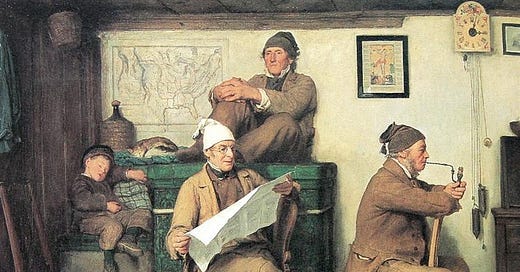#71 - Disciplining Kids with Natural Consequences
Raising the Bottom; Force of Nature; Flash Fiction Ideas; Time Machine
Hello, my friends,
My voice started going all croaky on Wednesday of this week which isn’t great because we’ve got weekend plans involving being among natural wonders. As you read this I’m likely evaluating my condition against the rigors of being outdoors with kiddos. What will be, will be.
I updated the Now age on my website for the first time after putting it up a month or so ago. A now page is a rundown of what a person is up to at the moment of the update. For purely selfish reasons, I think everybody should have one. The selfishness is because I want to know what’s going on with people on-demand. Like, I just thought about Sally while driving home and then I can go to her now page and see how stuff is moving along. Then I can call her and we can skip the catch-up go right to the deeper conversation.
So now that my little-bit of ketchup is done, let’s move into the deeper conversation…
Raising the Bottom
When I first started training for this 5K a couple of months ago, I hadn’t done much exercise, and especially hadn’t run any real distance, for many months. The “out” I had for myself before and during my runs at that time, the lowest expectation if you will, was that I could walk if I needed to. I’d finish whatever distance I had set out to cover that day, but I didn’t have to run it. Later, as my shape improved and I gained confidence, that bottom possibility changed to “I can slow down if I need to” but would keep running even if I was tired or didn’t feel well.
This adjustment to the “out” is a useful illusion when progressing in an activity because it tricks you maintaining a higher standard. It’s like how in a negotiation, you’re bound to get a better deal if you set the bottom of your price range higher. Sure, I know that I can start walking or even stop moving at any time during my runs, but those thoughts either don’t occur to me or are dismissed without consideration simply because my lowest expectation has changed.
With this newsletter, I’ve spoken to people about the challenge of a weekly commitment. My “bottom” isn’t that I won’t publish at all, but that I will write something shorter or cover a topic that’s easier for me to address. Usually, though, I know I’ll be fine once I settle in and get to typing.
I’d like to think that there are other examples or applications for this personal development principle. What do you think? Has adjusting your lowest expectation helped you become better at something?
Force of Nature
In The 7 Habits of Highly Effective People, Stephen Covey talks about the idea of natural consequences, where the result of an action isn’t necessarily directed by another person. In this entertaining story from the book, here narrated by the author, there is a natural consequence to not working:
In his Principle-Centered Leadership (Simon & Schuster, 1990), Covey enumerated the “30 Methods of Influence”. The final one is:
30. Let natural consequences teach responsible behavior.
One of the kindest things we can do is to let the natural or logical consequences of people’s actions teach them responsible behavior. They may not like it or us, but popularity is a fickle standard by which to measure character development. Insisting on justice demands more true love, not less. We care enough for their growth and security to suffer their displeasure.
I’ve been thinking about this a lot lately because it can be frustrating to get one’s bearing on disciplining a rowdy 5-year-old. It feels like I’m getting angry and raising my voice all the time but I’m only trying to help a child do the right thing, and he’s doing the exact opposite of what I say! I can already hear parents of teenagers snickering, “just you wait!” they’re saying. The difficulty is striking the right balance between correcting actions that have natural consequences and those that are a matter of preference; if the kids mess with the elevator door, for example, little fingers could get squashed. But they are loud in the elevator, there’s no tangible consequence, it’s just annoying.
And then there are situations where there presumably are natural consequences but they are either unimportant, unclear, or too long-term for youngsters. For instance, Michael is notorious for going to sleep late. His bedtime is eight, but occasionally he doesn’t fall asleep until ten. All of us adults would assume there is a natural consequence in the form of being tired the next day, but I haven’t found that to be the case with Michael. When he goes to sleep doesn’t correlate to when he awakens and doesn’t affect his behavior that I can tell. So am I getting bent out of shape for no good reason? What complicates matters is that his staying up is also irritating because he’s loud and wants attention so I can’t go about my limited evening hours in peace.
Lately, I’ve been employing the strategy of spotlighting natural consequences when he refuses to do something. Like if he is delaying getting into the bath I say, “Okay, I guess you’re not taking a bath today.” This works because he actually likes baths and, maybe more importantly, the bath is part of his routine so taking it away feels punitive to him. Yet, I’m not actually taking it away. The natural consequence of him not taking the actions necessary to take a bath is that…he won’t have a bath. Likewise, we were planning on taking a stroll at the Descanso Gardens last weekend except that Michael was playing instead of getting dressed. “Cool,” I said, “if you’re not ready by 10:30a, it’ll be too late to go and we’ll stay home.” Again, if he had waited too long, a sequence of natural consequences would have fallen into place that would’ve made it inconvenient for us to take our field trip. 10:30a wasn’t just an arbitrary time. We did end up going to the Gardens, seeing some crawdads, a frog, and some other beasts.
I suppose what I’m working on as a parent is getting less annoyed about situations where the natural consequences aren’t dire; should I get heated about Sophie drawing all over her pillow and bedsheet with her toy makeup? I could, but it’s easier to just change the sheet and throw the dirty one into the laundry. This being a pattern, I think I’ll need to take an inventory of my triggers and see which ones I can shift to disinterest.

Flash Fiction Ideas
I asked Claude AI for some weird, off-the-wall ideas for a flash fiction story and it did not disappoint:
• A sentient traffic light falls in love with a self-driving car
• An astronaut discovers their spacesuit is actually made of cheese
• A person's shadow detaches and goes on a crime spree
• Time starts flowing backwards, but only on Tuesdays
• A writer's characters escape the page and demand plot revisions
• Someone's belly button lint comes to life and starts a tiny civilization
• The last tree on Earth holds a press conference
• A telemarketer accidentally calls an interdimensional being
• Clouds begin spelling out cryptic messages in the sky
• A person swaps consciousnesses with their pet goldfish
• The world's languages suddenly swap speakers overnight
• A black hole opens up in someone's sock drawer
• Gravity becomes selective, only affecting objects starting with the letter 'P'
• Everyone's dreams start occurring in shared universe
• Elevators gain sentience and start playing matchmaker with passengers
Real talk, don’t be surprised if you see a stories here about “Past-Time Tuesdays” or a car/light love story. I’m tickled by these ideas but that necessarily leads to this question: If I use one of them, will I need to declare that AI was involved in the story’s creation? My hot take answer is yes, which leads to another question: Would that make the story itself less entertaining or valuable?
Time Machine
Here’s what I wrote in HMF a year ago (in issue #18):
Regeneration of Values: An appreciation of a leaders role in revitalizing belief systems. An idea from On Leadership by John W. Gardner.
The Desire: The Buddhist concept of Taṇhā (craving) and why I quite caffeine. Notably, I’ve come back to caffeine a little bit lately and I’ve run into the same issue. Will likely quit cold turkey again.
Thank you, Papa: Michael expressed gratitude and I loved it.
P.S.
Toddlers are strange and wonderful. A few mornings ago, I came into the kitchen and Sophie, who had been playing in her room last time I saw her, was standing on a chair. In front of her were two bowls and a carton of ice cream. When I spotted her, she was attempting to scoop some breakfast for her and Michael with a can opener. Almost there, baby!








the video is adorable! good lesson for all of us at all ages - we teach people how to treat us